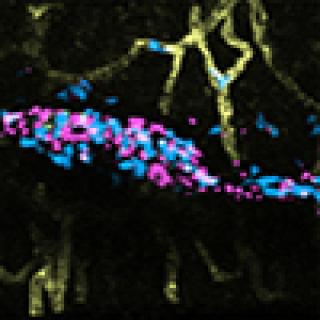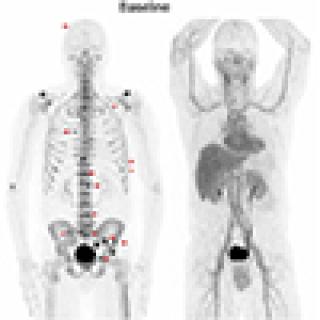News and Events
Celebrating CCR Careers: Steven Z. Pavletic, M.D., Ph.D.
Steven Z. Pavletic, M.D., Ph.D., is a renowned expert in chronic graft-versus-host disease, a serious late complication that can happen after allogeneic bone marrow transplants. After serving at the NCI for over 20 years, he is now announcing his retirement.
Read MoreClinical trial will evaluate chemotherapy-sparing approach to treating Kaposi sarcoma
CCR physician-scientists have launched a clinical trial to evaluate whether the immune-stimulating molecule NHS-IL12, alone or in combination with an experimental immunotherapy called M7824, reduces tumors in patients with Kaposi sarcoma.
Read MoreUndergraduate research at NCI sparks curiosity and new connections
Brandon Ogbunu, a Professor of Ecology and Evolutionary Biology at Yale, recalls the time he spent studying gene regulation in Susan Gottesman’s lab. He says the experience sparked interests that have helped shape his career studying evolution and disease.
Read MoreInnovative imaging tools reveal how neutrophils fight inflammation in mice
CCR researchers used state-of-the-art imaging techniques to observe, in real time, the path neutrophils take as they move toward a site of inflammation in a mouse model. The images showed the neutrophils leaving the blood vessels and engaging with bacteria that had been introduced into the mouse’s footpad. These observations led to the team’s discovery that the leukocyte LTB4 directs the recruitment, engagement, and penetration of neutrophils into inflamed tissues.
Read MoreFDA grants rare pediatric disease designation for experimental immunotherapy for acute lymphoblastic leukemia
A cell-based immunotherapy that is currently being evaluated at the NIH Clinical Center for the treatment of B-cell acute lymphoblastic leukemia (ALL) has been designated by the U.S. Food and Drug Administration as a drug for a rare pediatric disease. Designation could encourage development of this novel therapy for children with relapsed or refractory ALL.
Read MoreIn mice, new therapeutic strategy enhances the effects of immunotherapy in high ASS1-expressing cancers
Many prevalent cancers (e.g., lung, breast and colon) exhibit abnormally high expression of the enzyme ASS1. This results in greater production of genetic material incorporating purines, consequently making these tumors more resistant to immunotherapy. The researchers showed that drugs blocking purine production in these tumors enhance their response to immunotherapy.
Read MoreExperimental compound blocks SARS-CoV-2’s ability to infect and kill cells in the lab
A potential therapy for COVID-19 binds to a viral enzyme that SARS-CoV-2 requires for replication. With further development and testing, it might be an effective treatment for people with the disease.
Read MoreEpigenetic marker contributes to PARP inhibitor resistance
CCR scientists have discovered a way cancer cells can become resistant to PARP inhibitors, targeted therapies that are used to treat some ovarian, breast and prostate cancers.
Read MoreNew synthetic compounds alter RNA expression in bacteria
Researchers have succeeded in developing a number of different compounds that bind to ZTP riboswitches, which regulate RNA, in bacteria. Their approach could one day be used to create a new class of antibacterial drug.
Read MoreA Conversation with Adam Sowalsky, Ph.D.
Adam Sowalsky, Ph.D., is an Investigator in the Laboratory of Genitourinary Cancer Pathogenesis. He is seeking to tease apart the molecular mechanisms underlying prostate cancers that have a high likelihood of progressing and then identifying patients who might benefit from earlier therapy. He discusses what motivated him to pursue a career in cancer biology as well as what lies ahead for his research.
Read MoreClinical trial evaluates radiopharmaceutical as therapy for biochemically recurrent prostate cancer
Some men who have been treated for localized prostate cancer (PC) with surgery or radiation still have signs of the disease that are only detected by a blood test (a rising prostate specific antigen or PSA). This is called biochemically recurrent prostate cancer (BCRpc). Investigators in the Center for Cancer Research are leading a clinical trial exploring an option meant to be less toxic for treating BCRpc, which may impact microscopic bone disease seen only on PET scans, using radium-223.
Read More









